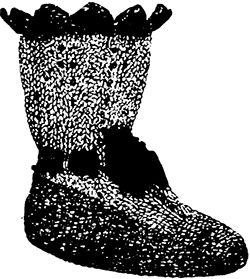
Please note: While this pattern has been updated into modern terminology and checked for accuracy, it has not been test knit.
Pattern
Knit the sock section of the bootee in white Saxony, and the shoe part in a colour of your choice.
A note on Saxony yarn from String or Nothing’s post on vintage yarns:
Saxony was often used for baby items, knit on 15s or 16s. The modern needle size equivalent would be 00s or an size in between 00 and 000. I’ve had success substituting modern three-ply fingering or baby yarn. (4-ply fingering is standard sock weight, knitting at 28 stitches = 4 inches, 3-ply is lighter, usually knitting at 32 stitches = 4 inches.)
The shoe section may be knit in moss stitch, garter or basket stitch.
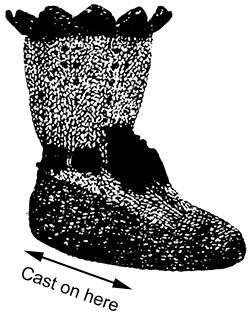
Cast on 26sts and work 1 row (RS).
Keeping your chosen stitch pattern correct, increase 1 stitch at the beginning of the next 9 rows. (35sts)
Work one row without shaping, increase at the beginning of the next row (36sts)
With the right side of your knitting facing you, the right hand edge is the heel and the left hand edge is the toe.
Work another 6 rows without shaping.
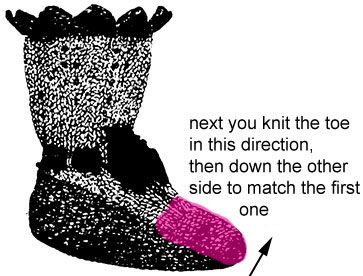
Cast off 24sts and work to the end of the row.
Work 25 more rows.
Cast on 24 sts and work to the end of the row.
Work 6 rows without shaping.
Dec 1 st at the beginning of the next row
Work 1 row without shaping
Dec 1 st at the beginning of the next 9 rows.
Work 1 row without shaping.
Cast off.
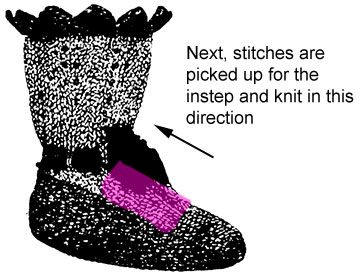
With white, pick up 18sts across the toe, between the sides of the slipper
Purl 1 row.
Row 1: p1, (k1, yo) four times, k1, p1, slip 2 sts onto a cable needle and holding them at the back of the work, k2, knit 2 stitches from the cable needle, p1, (k1, yo) four times, k1, p1 (26sts)
Row 2: k1, p2tog, p5, p2tog tbl, k1, p4, k1, p2tog, p5, p2tog tbl, k1 (22sts)
Row 3: p1, k2tog, k3, ssk, p1, k4, p1, k2tog, k3, ssk, p1 (18sts)
Row 4: k1, p5, k1, p4, k1, p5, k1
Repeat these four rows another 3 times
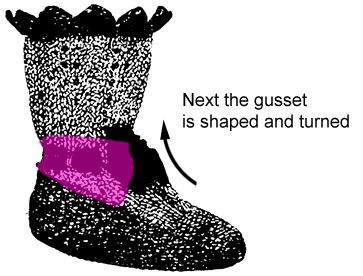
Cut the yarn.
Now, with the right side of the knitting facing you, pick up 18sts along the right hand side of the shoe section, knit row 1 of the pattern across the centre 18sts and pick up 18 stitches along the left hand side of the shoe.
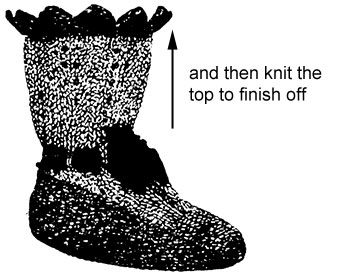
Row 2: k1, p5, k1, p4, k1, p5, k1, work row 2 of the pattern across the centre 18sts, k1, p5, k1, p4, k1, p5, k1
Row 3: p1, k5, p1, k4, p1, k5, p1, work row 3 of the pattern across the centre 18sts, p1, k5, p1, k4, p1, k5, p1
Row 4: * k1, p5, k1, p4, k1, p5, k1; repeat from * twice more
Now work as follows:
Row 1: * p1, (k1, yo) four times, k1, p1, slip 2 sts onto a cable needle and holding them at the back of the work, k2, knit 2 stitches from the cable needle, p1, (k1, yo) four times, k1, p1; repeat from * twice more.
Row 2: * k1, p2tog, p5, p2tog tbl, k1, p4, k1, p2tog, p5, p2tog tbl, k1; repeat from * twice more.
Row 3: * p1, k2tog, k3, ssk, p1, k4, p1, k2tog, k3, ssk, p1; repeat from * twice more.
Row 4: * k1, p5, k1, p4, k1, p5, k1; repeat from * twice more.
Repeat the last 4 rows 6 more times.
Cast off
Finishing
Sew the back seam, instep seam, then the foot from heel to toe.
If desired, thread a ribbon around the first row of eyelets after the gusset, and finish the top with a crochet shell stitch edge.
